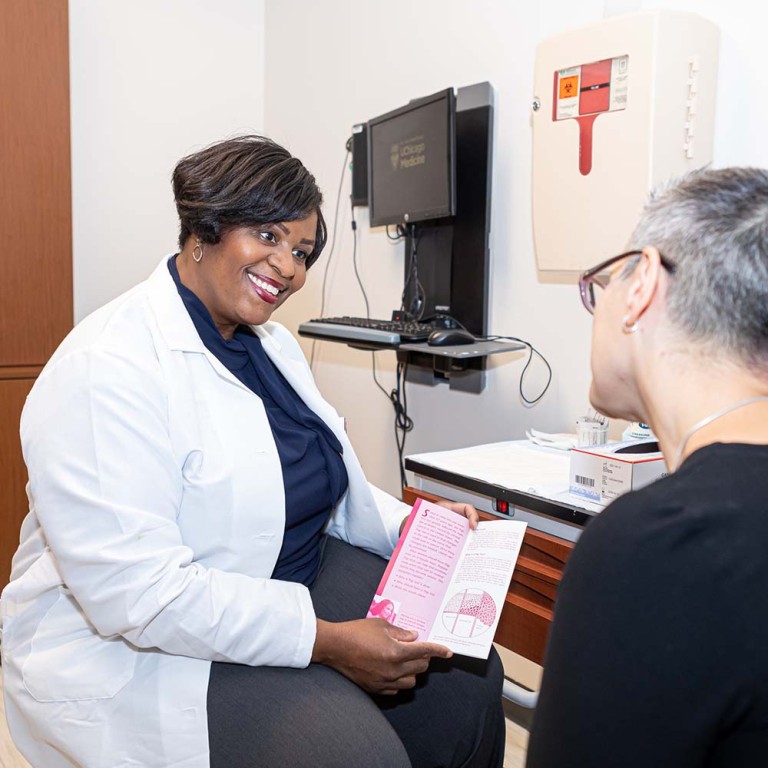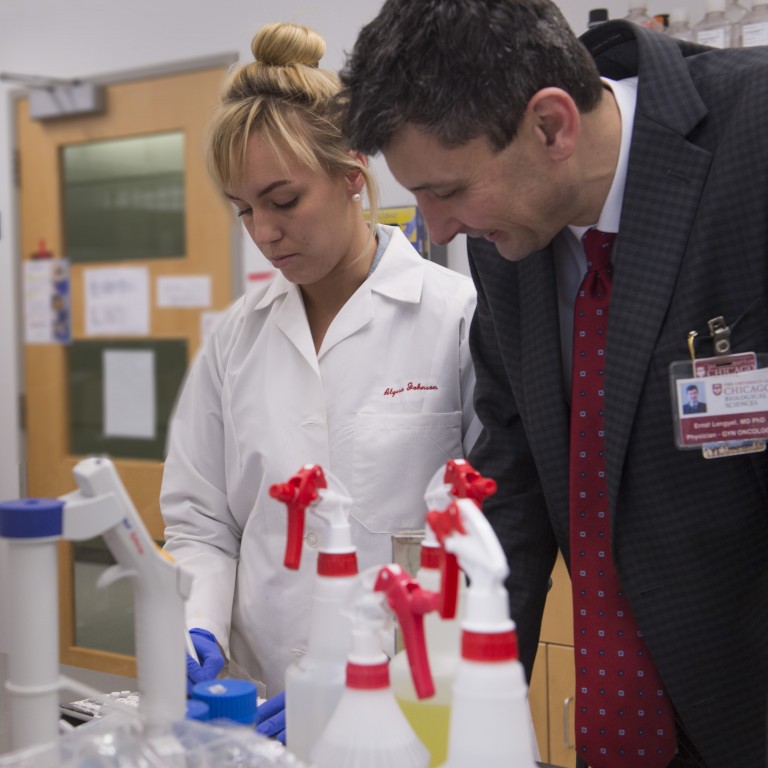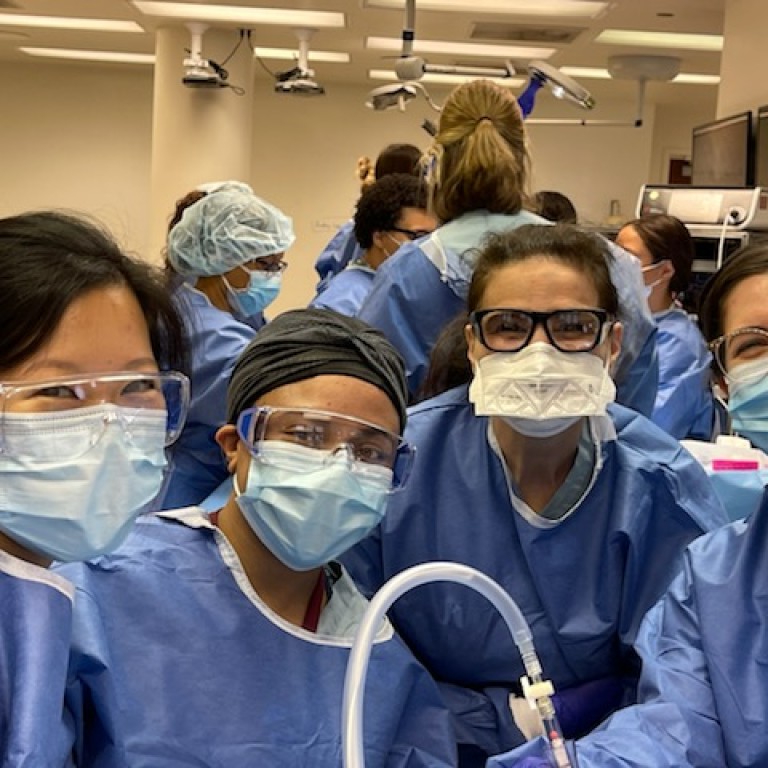Postdoctoral Position in Cancer Immunology and Immunotherapy
University of Chicago Comprehensive Cancer Center
Location: Chicago, IL
Job Description:
Kunle Odunsi, MD, PhD, seeks a Postdoctoral Scholar to study anti-tumor immune responses in ovarian and other solid tumors at the University of Chicago Medicine Comprehensive Cancer Center and the Department of Obstetrics/Gynecology. Our team focuses on mechanisms of tumor immune recognition, immunometabolism, and adoptive T cell therapies in mouse models and humans using state-of-the-art technologies in a cutting-edge, transdisciplinary environment. The appointee will work in close collaboration with leading translational scientists, molecular and systems biologists, and clinicians at the University of Chicago. Our group drives translation of new understandings to patient treatments quickly by working collaboratively across disciplines through to clinical trials.
Resources and opportunities:
- The Ovarian Cancer Specialized Program of Research Excellence (SPORE), funded by the National Cancer Institute for five years, provides immunogenomics, biostatistics, bioinformatics, biospecimen, and pathology core facilities to support your research.
- The University of Chicago is a leading world-renown research institution with impactful scientists and rich resources including the Polsky Center for Entrepreneurship and Innovation.
- University opportunities for professional development through trainings and workshops on mentoring, leadership, and management.
Benefits:
- Salaried position following the NIH NRSA Stipend scale with 4 weeks paid vacation, 8 designated holidays, and up to 12 days paid sick leave per year.
- Paid parental leave of up to six weeks after the birth or adoption of a child.
- Health benefit options including dental and vision.
- Retirement plan including University matching after 1 year of employment.
- Eligible for staff/faculty and student rental housing.
- Public transportation for easy access to downtown Chicago.
Qualifications:
- PhD or equivalent doctoral degree with background in immunology, molecular biology, or cancer biology; a record of scientific achievement through publications and presentations; a passion for translational science; excellent written and spoken communication skills in English; and an ability to conduct research independently with strong wet lab skills.
- Experience with flow cytometry, molecular biology techniques, cell culture, murine tumor models, and bioinformatics are preferred.
- You will be expected to demonstrate independence in experimental design and execution, work effectively with others in a collaborative setting, present results at both national and international meetings, and ultimately publish results.
To apply: Submit a curriculum vitae, a brief statement regarding research experience and interests, and a list of 2-3 references with their email addresses to adapistello@bsd.uchicago.edu. Additional information about postdoctoral benefits and opportunities in the University of Chicago Biological Sciences Division can be found at bsdpostdoc.uchicago.edu.
The University of Chicago is an Equal Opportunity/Affirmative Action Employer. All qualified applicants will receive consideration for employment without regard to race, color, religion, sex, sexual orientation, gender identity, national origin, age, protected veteran status or status as an individual with disability.
Overview:
Kunle Odunsi, MD, PhD, is Director of the University of Comprehensive Cancer Center (UCCCC), and Dean for Oncology, the AbbVie Distinguished Service Professor of Obstetrics and Gynecology, Biological Sciences Division at the University of Chicago.
Dr. Odunsi's lab focuses on understanding immune mechanisms at play in the tumor microenvironment (TME) and translates that understanding into clinical trials for ovarian cancer. In the TME, the immune system and tumor cells battle back and forth, and our lab is working to optimize conditions so that the immune system wins and tumor cells are cleared.
The Odunsi Lab is oriented toward clinical translation objectives, and the projects span from basic science to preclinical models, pre-clinical IND-enabling toxicity studies, clinical research, and clinical trials.
Research interests:
- Immunological mechanisms in anti-tumor responses in the tumor microenvironment
- Immunotherapy in gynecological cancer clinical trials
- Pre-clinical and clinical development of tumor antigen targeted therapies
- Mechanisms of immune recognition and localized immunosuppression in human ovarian cancer tumor microenvironments.
Currently, Dr. Odunsi is Principal Investigator of the Roswell Park/University of Chicago Specialized Program of Research Excellence (SPORE) in Ovarian Cancer (P50CA159981). Other funding sources for the Odunsi Lab include the US Department of Defense, the National Institutes of Health, and the National Cancer Institute.
|
Metabolic adaptation of ovarian tumors in patients treated with an IDO1 inhibitor constrains antitumor immune responses To uncover underlying mechanisms associated with failure of indoleamine 2,3-dioxygenase 1 (IDO1) blockade in clinical trials, we conducted a pilot clinical study in 17 patients with newly diagnosed advanced high-grade serous ovarian cancer. Patients were treated with the IDO1 inhibitor epacadostat, and immunologic, transcriptomic, and metabolomic characterization of the tumor microenvironment was undertaken in baseline and posttreatment tumor biopsies. We demonstrated that A2a and A2b purinergic receptor antagonists rescued NAD+-mediated suppression of T cell proliferation and function. Combining IDO1 inhibition and A2a/A2b receptor blockade improved survival and boosted the antitumor immune signature in mice with IDO1 overexpressing ovarian cancer.
|
|
Tcf-1 protects anti-tumor TCR-engineered CD8 + T-cells from GzmB mediated self-destruction T-cell longevity is undermined by antigen-driven differentiation programs that render cells prone to attrition. CD8 + T cells that express the Tcf-1 transcription factor have undergone limited differentiation and exhibit stem-cell-like functions that facilitate persistence. We engineered human CD8 + T cells to constitutively express Tcf-1 and a TCR specific for the NY-ESO-1 cancer-associated antigen. Co-engineered cells were assessed for potential for adoptive cellular immunotherapy. Constitutive TCF-1B expression protected T cells from apoptosis associated with elicitation of effector function and promoted stem cell-like characteristics. Our study presents constitutive Tcf-1B expression as a potential means to impart therapeutic T cells with attributes of persistence for durable anti-tumor activity.
|
|
A prime/boost vaccine platform efficiently identifies CD27 agonism and depletion of myeloid-derived suppressor cells as therapies that rationally combine with checkpoint blockade in ovarian cancer In contrast to other tumors, objective response rates to single-agent PD-1/PD-L1 blockade in ovarian cancer are limited. Using a pre-clinical model of aggressive ovarian cancer, we previously reported on a prime/boost cancer vaccine that elicits robust anti-tumor immunity, prolongs survival of tumor-bearing mice, and further improved when combined with checkpoint blockade. Using whole tumor transcriptomic data, we identified candidate therapeutic targets. In the context of a highly effective cancer vaccine, CD27 agonism or antibody-mediated depletion of granulocytic cells each modestly increased tumor control following vaccination, with anti-PD-1 therapy further improving efficacy. These findings support the use of immunotherapies with well-defined mechanisms(s) of action as a valuable platform for identifying candidate combination approaches.
|
|
Efficacy and Safety of Pembrolizumab in Combination With Bevacizumab and Oral Metronomic Cyclophosphamide in the Treatment of Recurrent Ovarian Cancer: A Phase 2 Nonrandomized Clinical Trial This clinical trial focused on immune checkpoint inhibitors augmented by combination therapy with bevacizumab and metronomic cyclophosphamide in patients with recurrent ovarian cancer. In this single-arm, phase 2 nonrandomized clinical trial, 40 patients with platinum-sensitive or platinum-resistant ovarian cancer received pembrolizumab with bevacizumab every 3 weeks and oral cyclophosphamide daily. The objective response rate was 47.5% with a median progression-free survival of 10.0 months, and this regimen was well tolerated with good quality of life during treatment. These findings suggest that the combination of pembrolizumab with bevacizumab and metronomic cyclophosphamide has clinical activity with a favorable toxicity profile in treatment of recurrent ovarian cancer.
|

Adekunle Odunsi, MD
Dean for Oncology
AbbVie Foundation Distinguished Service Professor of Obstetrics and Gynecology
Professor of Medicine
Committee on Clinical Pharmacology and Pharmacogenomics






